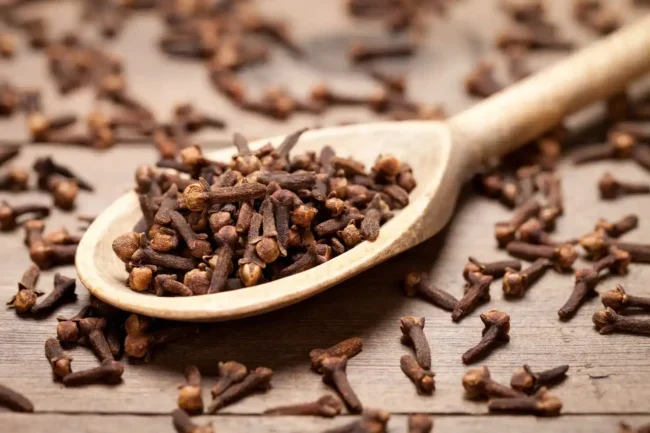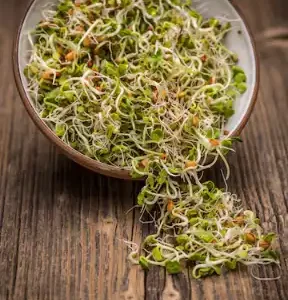The aromatic flower buds of the Syzygium aromaticum tree, offer various nutrients in their dried form. Here’s an overview of the nutrition profile of cloves per 100 grams:
- Calories: 274 kcal
- Protein: 5.98 g
- Fat: 13 g
- Saturated fat: 3.329 g
- Monounsaturated fat: 2.727 g
- Polyunsaturated fat: 4.337 g
- Carbohydrates: 65 g
- Dietary fiber: 33.9 g
- Sugars: 2.38 g
- Vitamins:
- Vitamin C: 11.7 mg
- Vitamin E: 8.82 mg
- Vitamin K: 141.8 µg
- Thiamin (B1): 0.227 mg
- Riboflavin (B2): 0.182 mg
- Niacin (B3): 1.465 mg
- Vitamin B6: 0.391 mg
- Folate (B9): 43 µg
- Choline: 23.4 mg
- Minerals:
- Calcium: 632 mg
- Iron: 11.83 mg
- Magnesium: 259 mg
- Phosphorus: 104 mg
- Potassium: 1020 mg
- Sodium: 277 mg
- Zinc: 2.32 mg
- Copper: 0.339 mg
- Manganese: 60.5 mg
- Selenium: 8.2 µg
These nutrient values are based on dried cloves and can vary slightly depending on factors such as growing conditions and processing methods. Cloves are a concentrated source of many essential nutrients, particularly fiber, vitamins, and minerals, making them a valuable addition to a balanced diet.
Health benits of clove:
Clove, both the spice and the essential oil derived from it, offers several potential health benefits:
Antioxidant Properties: Cloves are rich in antioxidants, which help protect cells from damage caused by free radicals. This can contribute to reducing the risk of chronic diseases like heart disease and cancer.
Anti-Inflammatory Effects: Clove contains compounds like eugenol, which have anti-inflammatory properties. These properties may help reduce inflammation in the body and alleviate symptoms of inflammatory conditions like arthritis.
Pain Relief: Eugenol, a major component of clove oil, has analgesic properties, making it effective in reducing pain. Clove oil is often used topically to alleviate toothaches and sore gums. It can also be used as a natural remedy for headaches and muscle pain.
Antibacterial and Antifungal Activity: Clove oil exhibits strong antibacterial and antifungal properties, which can help fight against infections caused by bacteria and fungi. It may be effective in treating oral infections, skin infections, and fungal conditions like athlete’s foot.
Dental Health: Clove oil is commonly used in oral care products due to its antibacterial properties. It can help fight against bacteria that cause tooth decay, gum disease, and bad breath. Additionally, clove oil’s numbing effect can provide temporary relief from toothache pain.
Digestive Aid: Cloves may aid digestion by promoting the production of digestive enzymes. They can help alleviate symptoms of indigestion, bloating, and gas. Clove oil is sometimes used to relieve nausea and vomiting.
Blood Sugar Control: Some studies suggest that cloves may help regulate blood sugar levels, which can be beneficial for individuals with diabetes or those at risk of developing the condition. Cloves may improve insulin sensitivity and reduce blood sugar spikes after meals.
Respiratory Health: Clove oil has expectorant properties, which can help loosen phlegm and mucus in the respiratory tract. It is often used in aromatherapy to relieve symptoms of colds, coughs, and congestion.








